- Home
- V. S. Naipaul
Beyond Belief: Islamic Excursions Among the Converted Peoples Page 5
Beyond Belief: Islamic Excursions Among the Converted Peoples Read online
Page 5
In 1926 Sukarno appeared, and national politics were transformed. But Mr. Wahid’s father and grandfather remained important in the religious movement.
“In 1935 the Dutch, worried by the Japanese threat, made a call for a local militia to defend Indonesia or the empire from the impending Japanese threat. And a congress called by my grandfather debated this point: Is it obligatory for true Muslims to defend a country ruled by non-Muslims? The resounding answer was yes, because the Muslims in Indonesia in 1935 under the Dutch had the liberty to implement the teachings of their religion. This means in my thinking that my grandfather saw Islam as a moral force, not as a political force exercised by the state.”
It was, it might be said, a colonial moral debate, among people who exercised no power, rather like the debate in India when the war came. And, as it happened, the militia in which Mr. Wahid’s father served was the one set up by the Japanese, who overran Indonesia in 1942.
“The Japanese established two kinds of militias, the Muslim ones and the nationalist ones. My father was the founder of the Hizbullah militia in 1944. The Japanese recruited young people from pesantren and religious schools. My father’s younger brother was trained and then appointed as battalion commander. With his headquarters situated right there in the pesantren, this involved the whole family in national affairs. They discussed the Japanese war, affairs in Germany, the independence movement.
“In 1944–45 the Japanese established a committee to prepare for Indonesian independence. It was chaired by Sukarno. My father was on this committee. He and eight other members of the committee formed the nucleus of the group to draw up the five principles of the new state, the panchasila. In that way he became one of the founding fathers of this state. So when the independence war broke out my father was involved directly. First he became a minister and then later he became political adviser to the commander of the armed forces, General Sudirman.
“My father went into hiding when the Dutch unleashed their aggression. I was evacuated to my maternal grandfather’s house. And there several times a week my father appeared, hiding in the house, not going out, treating his wounds, which were from diabetes, not from bullets. I had to get frogs to fry, to get oil from, for dressing those wounds. Ten to fifteen frogs a time, two or three times a week. After dressing his wounds he would go back to hiding in the nearby villages.
“When the Dutch yielded sovereignty to our state my father was appointed minister of religious affairs. He held that position for three years. In the Japanese time there had been an office of religious affairs which had been entrusted to my grandfather, but headed by my father as chief executive director. That office was the embryo of the department of religious affairs.”
And, as so often in narratives of this time, if the brutalities of their occupation could be set aside, the intelligence and speed—and the lasting effects—of the Japanese reorganization of a vast and varied area had to be acknowledged.
Mr. Wahid, child though he was, began to live close to national politics.
“My father took me when I was nine years old to this big rally in the Ikada Stadium. Sukarno was to be there.” This would have been in 1950. “The stadium had been built by the Japanese as a sop to us. It was where they now have this national monument.” And it was the park where, before an audience of a million, the French government were to put on their big firework display for the fiftieth anniversary of Indonesian independence. “Up to sixty thousand people were in the stadium to hear Sukarno. He looked like a giant to me. He made this fiery speech against the imperialists. Asking the public to unite in this fight, this struggle. And the people responded so emotionally. I felt so elated, sensing this movement of people participating in this ecstasy. So I shouted as well. I jumped. My father calmed me down. He said, ‘Sit down. Don’t jump.’ Maybe he didn’t want me to get tired. Otherwise he would have to carry me to the car.”
I wanted to hear more about the physical appearance of Sukarno.
Mr. Wahid said, “The posture was good. The face showed not handsomeness, but steely will, a kind of strength. To be frank with you, his face was rough. Reflecting authority, strength of will. That’s why he was charismatic. Especially when he raised his hands and shouted. You could see his eyes then, very alive, as though he was staring the imperialists down. My father being a minister, we were seated not far from him, in the first row. Sukarno stood there, facing us.
“My father died in 1953. He was thirty-nine years old. He had retired from the ministership in 1952 because our organization had been voted out of the only Islamic party of the time. My father retired from the cabinet and formed the new party, the NU, in 1952. He was very active in establishing branches of the party. In one of those trips I was in the front seat and he was in the backseat, and we had this accident in which my father was seriously injured and one day later died. He fell out of the door and was hit by the spin of the car as it skidded.
“My mother came in the night to Bandung, and a number of dignitaries accompanied his body in a hearse to Jakarta. What I saw impressed me deeply. Along the one-hundred-and-eighty-kilometer route people stood waiting for his body, to bid farewell to him. Thousands of them in the house, in the night. The next morning Sukarno came. And then the body was taken to the airport and flown to Surabaya. In Surabaya we were received by this big throng, tens of thousands of them, crying, bidding their farewell. With my uncle—a major general—on a motorcycle in front of the hearse, we passed through the crowd, three to four deep on each side of the road for eighty kilometers, to the family cemetery in Jombang.
“Seeing all these people weeping and saying good-bye to him like that, the impression on me was like this: Is there anything greater in life than being loved by so many people? I was a child when Gandhi died. Later in life I saw pictures of Gandhi’s funeral. It reminded me of my father’s funeral. That sharpens my orientation.”
This was the family story that Mr. Wahid told, through much of a warm afternoon, in a room at ground level in his NU headquarters in Jakarta, in the cloying smell of stale clove-cigarette smoke, while the two-lane traffic roared and fumed outside just beyond the cleared front yard. The family story—compressed at my request in some places, and sometimes elsewhere made to jump about—contained, layer by layer, the history of the country over the last century and a quarter. It was the story which had dictated the course of Mr. Wahid’s own life. It was the story to which he still referred his actions and attitudes.
He had inherited the leadership of his father’s party, the NU. In 1984 he had taken the party out of politics.
“We realized how detrimental the direct link had proved between Islam and politics—as in Pakistan, Iran, Sudan, Saudi Arabia—because people everywhere then saw Islam as a religion using violence, which in our thoughts is not so. In our thoughts Islam is a moral force which works through ethics and morality. This is not my thinking alone, but the collective decision of the ulamas educated by my grandfather. We had a bitter debate about it in 1983 with a Ph.D. in constitutional law.
“In 1991 the Forum for Democracy was established. This totally rejects Islamic politics—political Islam as posed by, say, Mr. Suharto and Professor Habibie. The competition between power centers in our country in the 1990s reflects the need on the president’s part for the widest possible support from the society. Which means from Islamic movements as well. To get that support, identification of national politics with Islam is necessary. My grandfather, by the 1935 decision”—the decision of the congress that it was all right for Muslims to defend a Dutch-ruled Indonesia against the Japanese—“saw the need to differentiate between the functions of religion and the functions of politics. Now, the decision of Minister Habibie to take the route of Islamization means that he sees politics as an integral part of Islam. I feel it personally because my father participated in the writing of the constitution which gives equal status to all citizens. People should practice Islam out of conscience, not out of fear. Habibie and his friends create a fea
r among non-Muslims and non-practicing Muslims to show their identity. This is the first step to tyranny.”
Mr. Wahid was passionate about this point. He came back to it again and again and always seemed to be waiting for me to take down his words. I tried to get him to talk in a more direct way of Habibie. I wanted to get a picture, some conversation, a story. It wasn’t easy.
“Habibie came to see me in hospital, and asked me to join ICMI, his Association of Muslim Intellectuals.”
I liked the detail about the hospital: it seemed to corroborate what I felt about Mr. Wahid’s health. But I couldn’t get more.
“My answer was: ‘Instead of joining your respectable group, let me stay outside the street-corner intellectuals.’ ”
This was what I noted down. I wasn’t sure what it meant, but later I decided that Mr. Wahid was speaking with extreme irony from his hospital bed, that Habibie’s respectable group and the street-corner intellectuals were the same people. Imaduddin, the preacher, the man on television, whose brainchild ICMI had been, would have been among those street-corner intellectuals, though Mr. Wahid hadn’t taken his name all afternoon.
Adi Sasono, an old supporter, would also have been in the line of fire. But this became clear only later, after I had been to see them all, and had only my notes to go by.
Adi said, near the end of our meeting in his fine office, “Mr. Wahid travels too much. He is a lecturer and an intellectual rather than a kiyai.” A kiyai, the head of a village pesantren: this would have been Adi’s way of twisting Mr. Wahid’s reputation, and pulling him down a notch or two. “A kiyai usually sits in a certain village in the pesantren and village people can come to him to ask questions. He is always with the people.”
Adi was chairman of the board of governors of CIDES, the acronym of an important ICMI “think-tank” whose full name was the Centre for Information and Development Studies. This explained the splendor of Adi’s offices. The elegantly produced large-format CIDES brochure that Adi gave me carried a foreword by Adi. This was from the first paragraph:
“The birth of the Indonesian Muslim Intellectual Association (ICMI) three years ago established increasingly our nation’s collective awareness of the importance of the human resources quality as a major renewable asset for development. This awareness should be manifested in big efforts based on development morality which emphasizes the centrality of human dimension in both the ideas and development practices. This view has also meant that a conscious and active participation of the nation as a whole is a very basic value.…”
Here, remarkably blown up, was Imaduddin’s human-resources, missionary idea, wrapped and wrapped again in modern-sounding words, corporate and academic. Words used like this were only wrapping. What was in the box was Imaduddin’s high idea of the destiny of Malay-speaking Muslims, his wish to complete a process of conversion that Europe had stayed for two or three hundred years, and finally on this far eastern frontier of the faith to raise the flag of Islam.
3
A CONVERT
HE LIVED near the Heroes Cemetery, in the Jalan Masjid Baru, the Street of the New Mosque. This was where he wanted me to come and see him, two days after our first meeting, at ten in the morning. I wanted to hear a little more about his past—his ancestry, the Sumatran background—and this was the only time he could manage, because he was flying off any day now to the United States and Canada to do his mental training work.
When he gave me the directions in his foundation office I knew I would have trouble finding the Street of the New Mosque. He wrote something on his card which he said would help the taxi driver. It didn’t help when the time came. The hotel taxi driver took me for many miles down a wrong road, against the inward-moving morning traffic, partly because he thought it was enough to aim in the general direction of the Heroes Cemetery, and partly for the pleasure in traffic-choked Jakarta of having a good long fast drive down a clear lane.
In a kind of penance, then, we had to crawl back with the crawl we had ignored on the way out, and after this—asking for directions all the time, ten o’clock coming and going—we had to pick our way between highways. We moved down narrow, half-paved, many-angled lanes, in a constant close play of morning light and shadows, with small new houses in small plots, sometimes with flowering shrubs, food barrows in some of the deeper, shaded angles of the road, occasional patches of wet, dusty heaps of gathered-up leaves, children: the skyscraper wealth of Jakarta, with its global intimations, reduced here to a kind of local small change.
We came at last to the Street of the New Mosque. We turned and twisted until we came to the number on Imaduddin’s card. I paid the enormous sum showing on the meter, and the driver left me immediately, as though he was worried that I might change my mind about the money. It was about ten-thirty.
No one came out of the house. It was a small house, noticeably well kept. At the left a wide gateway led to a big, built-in garage with a sliding door: a tight fit in the narrow plot. To the right was a very narrow strip of lawn, and just beyond that, at ground level, the shiny red tiles of an open porch. I called from there, “Good morning.” Still no one came out. I went through the open door into the sitting room. It was a low room, cool and dark after the sunlight of the porch. I called again. A serving girl in a brown frock leaned out from the kitchen to the left, beyond the dining area, allowed her eyes to rest on me, with something like fright, and then pulled herself back without a word.
I said to the empty room, “Mr. Imaduddin! Mr. Imaduddin!”
Another serving girl came shyly out of the kitchen. She, as though wishing only to see what the other had seen, took one frightened look at me, and she too melted back into some hiding place beyond the kitchen.
I called, “Mr. Imaduddin! Good morning, Mr. Imaduddin!”
The house remained silent. He had asked me to come at ten. I was half an hour late, but he should have been still in the house. A large framed piece of Arabic calligraphy on one wall was very much like Imaduddin—foreign travel among the faithful: a gift perhaps, a souvenir—but I began to wonder whether I had come to the right place. I also began to wonder how, without the language and a map, I could make my way back to a main road where taxis plied.
Because of the silence I didn’t feel I should call out any more, and then I felt I shouldn’t walk too freely about the room. I stood where I was and waited and looked.
The floor was tiled, with beautiful reed mats. The low ceiling, of a composite bagasse-like board, was stained where rain had once leaked through. In the dining area there was a microwave, next to some group photographs. On the pillars of the sitting room there were two or three decorative little flower pieces and, surprisingly, a picture of a sailing ship. About the sitting room were small mementos of foreign travel, tourist souvenirs, showing a softer side of Imaduddin (or his wife), a side not connected with mental training, if indeed the house was theirs, and if these mementos had truly tugged at their hearts (and did not, rather, preserve the memory of some pious giver): a number of Japanese things; an Eiffel Tower; above the watercooler in a corner a Delft china plate with a simple, blurred, romantic view of a winding Dutch road and a farmhouse and a church; against a pillar a dwarf red maple growing out of a white dish, the dish on a silver-fringed doily, the whole thing resting—as if casually—on a slatted magazine stand. The back window of the dark room gave a view of a sunny little rock-walled garden, bounded by the red-tile roof of the neighboring house: spaces were really small here.
I considered these details one by one, as if committing them to memory, and almost with a separate part of my mind wondered how long I should stay where I was, violating the house, and how when the time came I might get away from the curious trap I appeared to have fallen into.
Suddenly, after ten minutes, or perhaps fifteen minutes, a door to the left opened, and Imaduddin appeared, informal and unexpected in an ankle-length sarong and a dark-green shirt.
He said in a preoccupied way, “I’m sorry. I have problems.”
I thought they might have been bathroom problems, but then a tall brown-complexioned man came out behind him. The tall man had twinkling eyes and a shiny skin, and was in a sarong as well, but was less informal than Imaduddin. The bottom of his sarong moved elegantly with his slow, stately steps. He had a flat black Muslim cap and a glaucous blue waistcoat-shirt with a pen clipped to the pocket.
Imaduddin said, “I am having some massage.”
That explained the shiny skin of the man in the black cap.
The room from which they came out would have been next to the garage and would have overlooked the little lawn and the lane. They would have heard me arrive, and would have heard me call.
Imaduddin said, “Getting old, you know.”
As though that, and the trouble with his back, for which the masseur came every few days, was explanation enough. And, indeed, there appeared to be some formality about the masseur’s visit. Imaduddin’s farewell to him, some minutes later, and Imaduddin’s wife’s farewell, was full of ceremony.
When he had dressed, and was belted and tight and firm in trousers and shirt, familiar again, we settled down to talk at the dining table, between the microwave and the group photographs on one side and the watercooler and the Dutch china plate on the other side. The serving girls, one in a red frock, one in a brown, had recovered from their fright, and were busy once more about the house and kitchen.

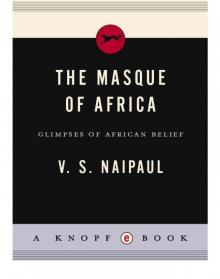 The Masque of Africa: Glimpses of African Belief
The Masque of Africa: Glimpses of African Belief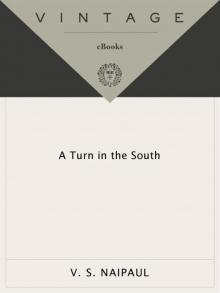 A Turn in the South
A Turn in the South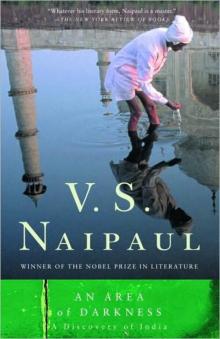 An Area of Darkness
An Area of Darkness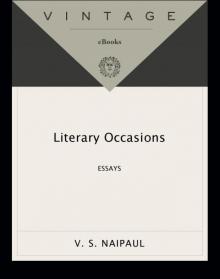 Literary Occasions: Essays
Literary Occasions: Essays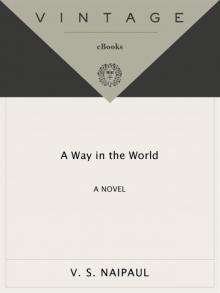 A Way in the World
A Way in the World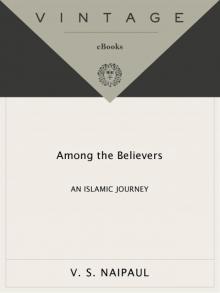 Among the Believers: An Islamic Journey
Among the Believers: An Islamic Journey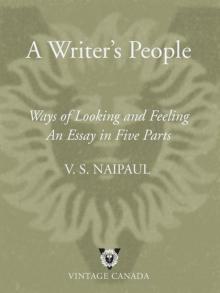 A Writer's People: Ways of Looking and Feeling
A Writer's People: Ways of Looking and Feeling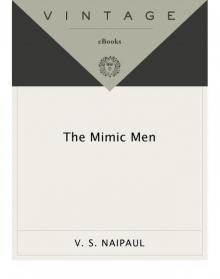 The Mimic Men: A Novel
The Mimic Men: A Novel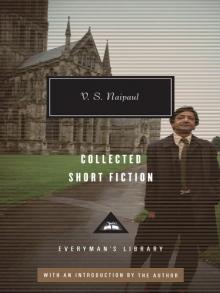 Collected Short Fiction
Collected Short Fiction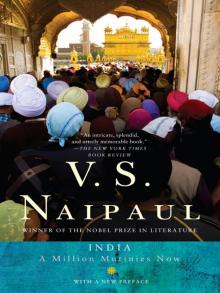 India: A Million Mutinies Now
India: A Million Mutinies Now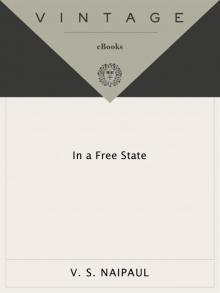 In a Free State
In a Free State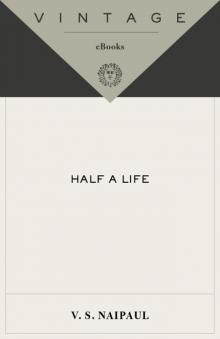 Half a Life
Half a Life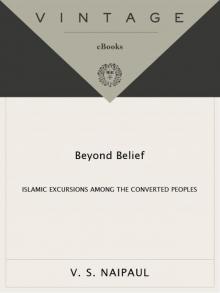 Beyond Belief: Islamic Excursions Among the Converted Peoples
Beyond Belief: Islamic Excursions Among the Converted Peoples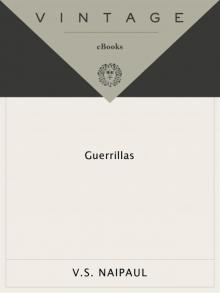 Guerrillas
Guerrillas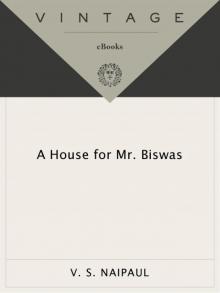 A House for Mr. Biswas
A House for Mr. Biswas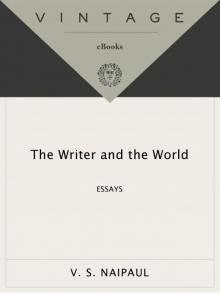 The Writer and the World: Essays
The Writer and the World: Essays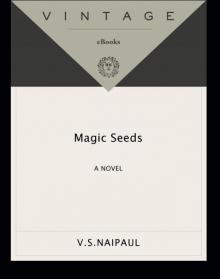 Magic Seeds
Magic Seeds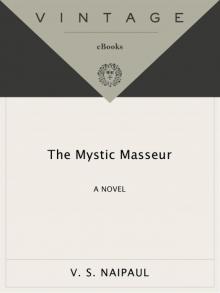 The Mystic Masseur
The Mystic Masseur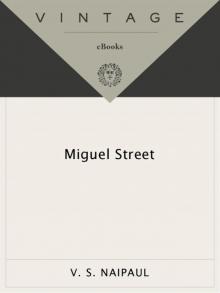 Miguel Street
Miguel Street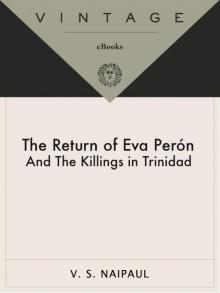 The Return of Eva Perón, With the Killings in Trinidad
The Return of Eva Perón, With the Killings in Trinidad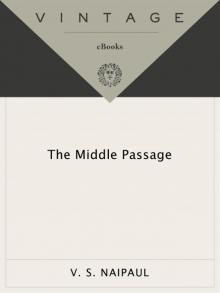 The Middle Passage
The Middle Passage A Bend in the River
A Bend in the River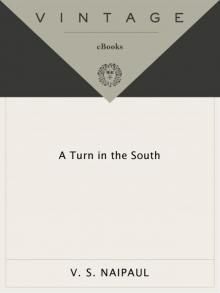 A Turn in the South (Vintage International)
A Turn in the South (Vintage International)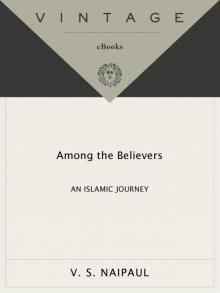 Among the Believers
Among the Believers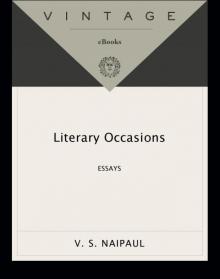 Literary Occasions
Literary Occasions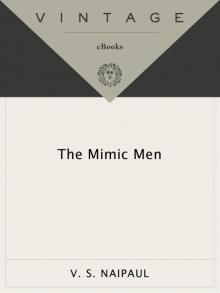 The Mimic Men
The Mimic Men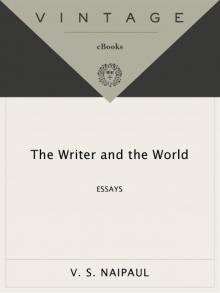 The Writer and the World
The Writer and the World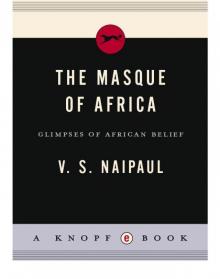 The Masque of Africa
The Masque of Africa